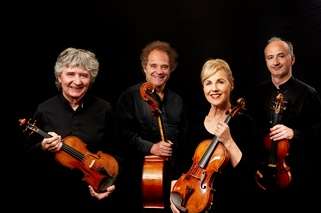|
Back
Valedictory Address New York
Alice Tully Hall, Lincoln Center
03/09/2017 -
Johannes Brahms: Quintet for Clarinet and String Quartet in B minor, Op. 115
Joseph Haydn: String Quartet in F major, Op. 77, No.2
Maurice Ravel: String Quartet in F major
Anthony McGill (clarinet), Takács Quartet: Edward Dusinberre (first violin), Károly Schranz (second violin), Geraldine Walther (viola), András Fejér (cello)

K. Schranz, A. Fejér, G. Walther, E. Dusinberre (© Keith Saunders)
“...the twin to a far greater folly”
Brahms describing his Clarinet Trio while composing the Quintet
One Russian is an anarchist; two Russians are a chess game; three Russians are a revolution; four Russians are the Budapest String Quartet. The Takács Quartet was formed by four Hungarians in the 1990’s but over the years two of them have been replaced, one by a Briton and one by an American; the group is now based in Colorado.
Last works are particularly telling: Bruckner’s 9th, Mahler’s 10th, Mozart’s Requiem, Kubrick’s Eyes Wide Shut, all arguably and tantalizingly unfinished. These valedictory masterpieces expose the sum total of an artist’s personality, morality, quality and totality of vision. Brahms wrote a few piano and organ pieces afterwards, many with remarkably sophisticated emotional content, but the most vivid of his revelatory works are those featuring the clarinet. Hosting former Metropolitan Opera and current New York Philharmonic principal clarinetist Anthony McGill made this evening by the Takács Quartet particularly interesting.
In a stunning reversal, the Brahms was moved from last to first, perhaps because Mr. McGill was needed next door for the Philharmonic’s all John Adams evening. My initial reaction was shock but, as it turned out, it was perhaps a good idea to get this rather unfortunate performance out of the way as early as possible. Everyone has a favorite composer and Brahms is mine; I have heard many dozens of performances of this quintet from amateur and student performances to Reginald Kell on recordings. This current version ranks near the very bottom of this pile, primarily because there was little or no sense of progression, no emotional content to the phrasing, no sense that this group had mastered the valedictory tone of this astounding work.
Now we can’t expect every clarinetist to be so enamored of this piece that, like Simeon Belleson, they would take the trouble to employ a clarinet made entirely of wood, an Oehler for example, to achieve just the right timbre for their performance. And yet, we are accustomed to hear the Mozart concerto played on a relatively obscure basset horn to project exactly what the composer had in mind. But Mr. McGill, whom we have enjoyed at both of his Lincoln Center jobs, seemed distant from his own part. I realize that he was not sight reading, but often it sounded as if he were.
The whole point of a variation suite is that the original theme when reprised should sound noticeably different. In this performance it did not. There seemed little attempt to fashion phrases with a high emotional content, no subtle use of breath or phrasing to make one’s point. Rather this reading was but a slog, especially the adagio, which came and went without any significant changes in volume or breath control to emphasize phrasing subtleties. A grand disappointment.
The remainder of the program was less controversial and showed that the quartet has performed these works steadfastly. The Haydn was undoubtedly chosen to be a good opener, but lost its mojo a bit by being jammed into the middle of this surrealistic concert. I don’t claim to know all of the master’s quartets – in fact, my familiarity with this body of work stems from watching the old Ernie Kovacs show on 1950’s black and white television. Anyway, it is a pleasant and predictable work (right down to the hunting atmosphere) and the Takács played it well. At Alice Tully people wander in and out of the auditorium willy-nilly. If only I had simply waited for the Haydn to begin an abbreviated concert, I would have been relatively happy.
It is amazing to realize that the magnificent Ravel quartet was written only twelve years after the Brahms. Much has been written about how jazz spilled over into the classical oeuvre in the 1920’s, but Ravel was incorporating “the sound of surprise” way back in 1902. Particularly in the second movement, the quartet, who has obviously rehearsed this piece quite a lot, navigated the tricky temporal waters with apparent ease and phrasing mastery. The all pizzicato section of the work was playful yet profound, in other words enunciated correctly. The Takács Quartet will apparently always be chasing the celebrity of its original founder Gabor Takács-Nagy, but still shows the potential for a steady and lengthy career.
Fred Kirshnit
|